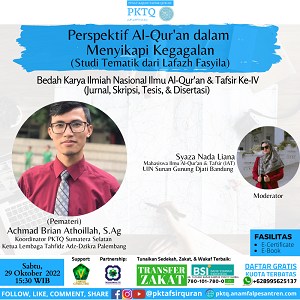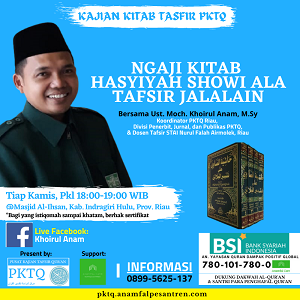IQSA Annual Meeting 2019 In California USA
February 01, 2019
The International Qur’anic Studies Association has opened its call for papers for its Annual Meeting to be held in San Diego, California from November 22–25, 2019. Paper proposals should be submitted through the SBL’s automated online submission system under the corresponding “Affiliates” link by March 6, 2019 (note: IQSA membership is required for proposal submission; see below).
 |
| Quran International Event : IQSA Annual Meeting 2019 In California USA |
Submission links can be found below under the respective program units. If you require further information or experience difficulties with the submission process, please contact the chairs of the program unit to which you would like to apply.
Date : November 22–25, 2019
Please note that all proposals must include:
- Author name and affiliation
- Paper title
- 400 word paper abstract (written in English)
Eligibility for proposal submissions is contingent upon the following:
- Active IQSA membership is required at the time of proposal submission for the IQSA Program, and the membership status of all applicants will be checked prior to acceptance
- Participants must maintain current IQSA Membership through their participation in the Annual Meeting
Please also note that:
- To ensure equity and diversity amongst participants, participants should submit only one paper presentation per IQSA Annual Meeting
- All participants must adhere to IQSA’s Professional Conduct Policy
- Participants will be required to register for the conference by submitting payment through SBL’s online submission system (users are strongly encouraged to take advantage of the “Super Saver” rates which end mid-May)
The Annual Meeting includes panels for each of IQSA’s six program units:
Linguistic, Literary, and Thematic Perspectives on the Qur’anic CorpusThe Qur’an: Surah Studies Qur’anic Studies: Methodology and HermeneuticsThe Qur’an: Manuscripts and Textual CriticismThe Qur’an and the Biblical TraditionThe Qur’an and Late Antiquity
IQSA will also run two additional panels this year:
The European Qur’an: The Islamic Holy Scripture in European Culture and Religion 1142–1850
The Societal Qur’an
The Societal Qur’an
PROGRAM UNIT 1
Linguistic, Literary, and Thematic Perspectives on the Qur’anic Corpus
Linguistic, Literary, and Thematic Perspectives on the Qur’anic Corpus
Program Unit ChairsAnne-Sylvie Boisliveau
Mohsen Goudarzi
Mohsen Goudarzi
The Linguistic, Literary, and Thematic Perspectives on the Qur’anic Corpus unit invites proposals for papers that engage with the techniques utilized in the Qur’an for crafting imagery, characters, and narratives. Proposals may attend to artistic and literary strategies as well as to the broader social, religious, and political ends towards which these strategies are deployed.
PROGRAM UNIT 2
The Qur’an: Surah Studies
The Qur’an: Surah Studies
Program Unit ChairsMarianna Klar
Shawkat Toorawa
Shawkat Toorawa
The Surah Studies Unit of IQSA invites proposals for individual papers on any aspect of Surat al-Waqi‘ah (Q 56). Proposers may, for example, wish to explore: the surah’s liturgical and devotional importance for Muslims (it appears in almost all lists of the suwar al-munjiyat, the “surahs that save”); the surah’s division of the judged into three groups (companions of the left, companions of the right, and frontrunners), rather than the more usual pairing into those in paradise and those in hell; Shiite interpretations of the surah, notably the frontrunners (al-sabiqun v. 10, al-muqarrabun v. 11); the surah’s structure and composition, notably the shift that takes place after v. 75; the rhyme scheme and the reasons for the departures from it; the surah’s eschatological and polemical themes; and much else besides.
The Surah Studies Unit encourages and welcomes diverse methods and approaches. Indeed, the raison d’être of the panel is to bring different perspectives on a given surah—especially surahs receiving little scholarly attention otherwise—into dialogue with one another.
PROGRAM UNIT 3
Qur’anic Studies: Methodology and Hermeneutics
Qur’anic Studies: Methodology and Hermeneutics
Program Unit ChairsKaren Bauer
Feras Hamza
Feras Hamza
This unit aims to understand and contextualise the methods and hermeneutics applied to the Qur’anic text, both historical and contemporary. The Methodology and Hermeneutics unit addresses questions that might implicitly govern other units, such as: What is Qur’anic Studies, and how does the study of the Qur’an differ from the study of its interpretation? What are the methodological differences between descriptive and normative approaches to the text? How does context (intellectual, social, ethical, historical) affect hermeneutical approaches to the text? The unit welcomes papers addressed to the hermeneutics and methods of particular schools of interpretation or thought, and also on hermeneutics as applied to specific subjects or concepts such as social justice and gender.
This year the Methodology and Hermeneutics unit additionally invites submissions with a special focus on European hermeneutics and the Qur’an. The predominantly European tradition of 20th century hermeneutics that is exemplified by such seminal figures as Dilthey, Heidegger, Bultmann, Gadamer, Tillich, and Ricoeur has produced a rich and sustained inquiry into the possibilities of an epistemology of, and an interpretive methodology for, “the text.” Interrogating the very relationship between the reader and the text, this hermeneutical tradition has offered insights into the nature of language, readership, reception, discourse as event, interpretive predispositions, and “worlds” opened up by the text. To what extent do these insights have implications for our understanding of the Qur’an? What insights from the European tradition have had resonance with scholars of the Qur’an, and have prior attempts to incorporate such insights been successful?
PROGRAM UNIT 4
The Qur’an: Manuscripts and Textual Criticism
The Qur’an: Manuscripts and Textual Criticism
Program Unit ChairsAlba Fedeli
Shady Hekmat Nasser
Shady Hekmat Nasser
The aim of the Manuscripts and Textual Criticism unit is to provide a cross-disciplinary setting for the exploration of the various interconnected issues that arise when questions concerning the Qur’an’s text are investigated through the prism of its manuscript tradition. This latter term encompasses the field of Qur’an manuscripts per se, but also alludes to such information regarding the history of the text that can be gleaned from the citations, marginal notes, and detailed analysis provided in other branches of the Islamic sciences, for example Qur’an commentaries and the qira’at literature. It is hoped that bringing together scholars from a variety of disciplines will serve to enrich and strengthen each of these fields. The Manuscripts and Textual Criticism unit seeks to create a forum for the application of textual criticism to the Qur’anic text attested both in physical manuscripts and within the wider Islamic tradition. It also aims to investigate palaeographic, codicological, and art historical features in the Qur’an’s manuscript tradition.
The unit welcomes papers on any topic within the range of the interests of the Manuscripts and Textual Criticism program unit. In addition, the unit proposes a special thematic session for 2019: “Life of Qur’an manuscripts.” We invite proposals that touch upon issues related to the modification of manuscripts after they have been produced. Papers dealing with all eras and regions of the manuscript tradition are welcome. Submissions might focus on the insertion of marginalia notes, colophons, waqf statements, annotations, additions, amendments, the recycling of writing surfaces, etc., or on references to such practices in the traditional literature.
PROGRAM UNIT 5
The Qur’an and the Biblical Tradition
The Qur’an and the Biblical Tradition
Program Unit ChairsNora K. Schmid
Holger Zellentin
Holger Zellentin
This unit was established in order to study the Qur’an’s relationship to the biblical tradition in the broadest possible sense of the term. We are interested, for example, in exploring the Qur’an’s reaction to the exegetical, homiletic, and narrative traditions of the Bible, in both written and oral form. We invite an engagement with the books of the Hebrew Bible and the New Testament, regardless of a particular book’s status of canonization within specific Jewish or Christian groups, and in the various languages of their original composition as well as in later translations. We especially encourage studies of the legal corpora that have developed in close dialogue with this biblical tradition prior to the emergence of the Qur’an and, subsequently, in exchange with the Qur’an.
For the 2019 Annual Meeting we further announce a themed session: “Theology of the Body in the Biblical Tradition and in the Qur’an.” This session will investigate the body as a useful site for studying qur’anic theological discourses in comparison with the biblical tradition. Since Peter Brown’s groundbreaking work, The Body and Society: Men, Women, and Sexual Renunciation in Early Christianity (1988), the scholarly turn to the body has transformed the study of religion. In the Qur’an as well as in biblical traditions, the body figures prominently both as a site of human agency and as an agent itself. We welcome proposals for papers that deal with the diverse ways in which theological discourse shapes human attitudes towards the body (e.g., attitudes towards celibacy, diet, discipline, the embodied components of ritual, etc.), as well as papers that investigate the impact of the somatic on theological discourse (e.g., embodiment in devotional piety, corporeal aspects of apocalyptic representations, etc.), in the Qur’an and in biblical traditions.
PROGRAM UNIT 6
The Qur’an and Late Antiquity
The Qur’an and Late Antiquity
Program Unit ChairsJohanne Christiansen
Michael Pregill
Michael Pregill
For the 2019 IQSA Annual Meeting in San Diego, the Qur’an and Late Antiquity program unit invites proposals that utilize various types of material or evidence—be that literary, documentary, or epigraphic—to illuminate the historical context in which the Qur’an was revealed and the early Islamic polity emerged. We are especially interested in papers that present and discuss comparative methodologies to contribute to a better understanding of the Qur’an’s place in the cultural, political, social, and religious environment of Late Antiquity.
SPECIAL PANEL 1
The European Qur’an: The Islamic Holy Scripture in European Culture and Religion 1142–1850
The European Qur’an: The Islamic Holy Scripture in European Culture and Religion 1142–1850
Panel Chairs:John Tolan
Roberto Tottoli
Roberto Tottoli
The Muslim holy book has been a part of European culture since its first translation into Latin by Robert of Ketton in 1142. Qur’an manuscripts and manuscripts of Qur’an commentaries, meanwhile, have been used, commented upon, and circulated in Europe since the Middle Ages. Beyond the mere fact of translating, copying, and printing the Qur’an in Europe (in Arabic, Latin, and the various European vernaculars), this panel will explore how the Qur’an was mobilized in debates about European cultural identities: in polemics between Protestants, Catholics, and Unitarians; in debates about the power of the Catholic (or Anglican) Church; in discussions about the renewal and reform of Christianity or Judaism; in debates about the place of religion in secular European societies. We invite papers on these and other instances of the impact and the utilization of the Qur’an in Europe between the twelfth and early nineteenth centuries.
SPECIAL PANEL 2
The Societal Qur’an
The Societal Qur’an
Panel Chairs:Thomas Hoffmann
Johanna Pink
Johanna Pink
The Societal Qur’an panel invites proposals for papers that investigate the Qur’an in its lived and societal contexts throughout history, from Late Antiquity to contemporary Late Modernity. Proposals are encouraged that engage with sociological, anthropological, and political science theories and methods in their pursuit of the societal and lived Qur’an. Papers might, for instance, discuss topics such as ritual and artistic uses of the Qur’an, practices of teaching the Qur’an, talismanic and medical uses of the Qur’an, the production of manuscript, print, and new media versions of the Qur’an, or the deployment of the Qur’an in terms of social identity and political organization.
Info lengkap : www.iqsaweb.org
*Share by PKTQ. Terkait informasi dan kegiatan tanggungjawab oleh penyelenggara. Silahkan konfirmasi kebenaran dan kepastiannya.















0 komentar